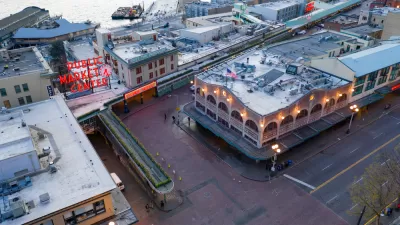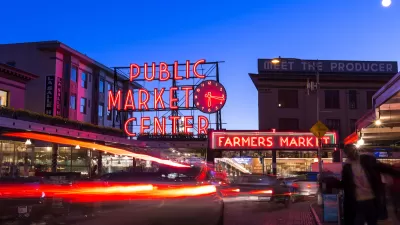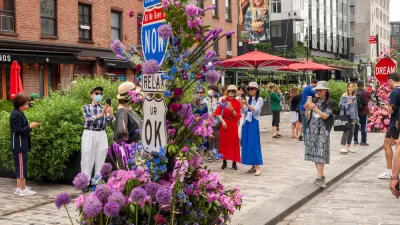It's been more than a century since the Seattle City Council decided to remove farmstands to make space for cars at the Pike Place Market. Public and political opinion is starting to see that decision as a mistake that can be reversed.

The Seattle Times Editorial Board has picked a side in one of the most heated urbanism debates to emerge from Seattle's pandemic experience: whether to block cars from accessing the streets in front of the Pike Place Market.
"City and Pike Place Market officials should make a priority of getting cars off the three blocks of Pike Place fronting the market, and the block of Pike Street that connects the market to the city," according to the editorial board.
A news article by David Kroman for The Seattle Times, published earlier in December, documents the growing public and political support for the change after the pandemic created an opening for a conversation about an idea that had previously been considered a political third rail.
Now The Seattle Times editorial board is willing to say what only the most ardent multi-modal advocates have been saying for years: it's probably not a good idea to allow cars and people to mix in one of the most visited corners of the city.
"If it was ever a good idea to allow motorists to drive through the crowds jostling along the brick street to browse market wares or stage selfies, that day has long passed. It shouldn’t take a heroic civic effort to block traffic from a minuscule fraction of downtown streets to benefit pedestrians who flock to the market by the millions each year," according to the editorial.
Any potential car-free future for the market is still a long way off, however. So far city officials with the power to expedite the car-free changes are only promising meetings—which could take a long time in a city famous for the 'Seattle Process,' which the editorial describes as "endless conversations and stalled progress."
FULL STORY: Let pedestrians enjoy Pike Place Market without cars

Alabama: Trump Terminates Settlements for Black Communities Harmed By Raw Sewage
Trump deemed the landmark civil rights agreement “illegal DEI and environmental justice policy.”

Planetizen Federal Action Tracker
A weekly monitor of how Trump’s orders and actions are impacting planners and planning in America.

Why Should We Subsidize Public Transportation?
Many public transit agencies face financial stress due to rising costs, declining fare revenue, and declining subsidies. Transit advocates must provide a strong business case for increasing public transit funding.

Understanding Road Diets
An explainer from Momentum highlights the advantages of reducing vehicle lanes in favor of more bike, transit, and pedestrian infrastructure.

New California Law Regulates Warehouse Pollution
A new law tightens building and emissions regulations for large distribution warehouses to mitigate air pollution and traffic in surrounding communities.

Phoenix Announces Opening Date for Light Rail Extension
The South Central extension will connect South Phoenix to downtown and other major hubs starting on June 7.
Urban Design for Planners 1: Software Tools
This six-course series explores essential urban design concepts using open source software and equips planners with the tools they need to participate fully in the urban design process.
Planning for Universal Design
Learn the tools for implementing Universal Design in planning regulations.
Caltrans
Smith Gee Studio
Institute for Housing and Urban Development Studies (IHS)
City of Grandview
Harvard GSD Executive Education
Toledo-Lucas County Plan Commissions
Salt Lake City
NYU Wagner Graduate School of Public Service





























